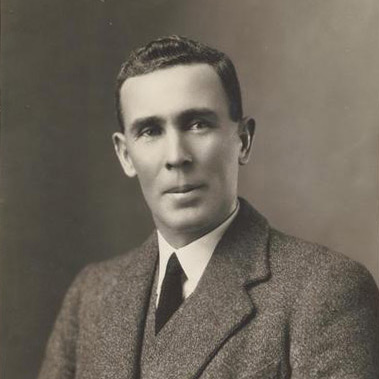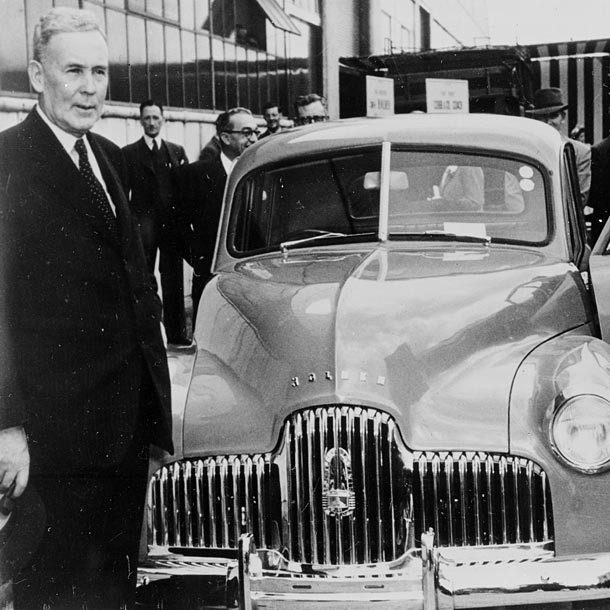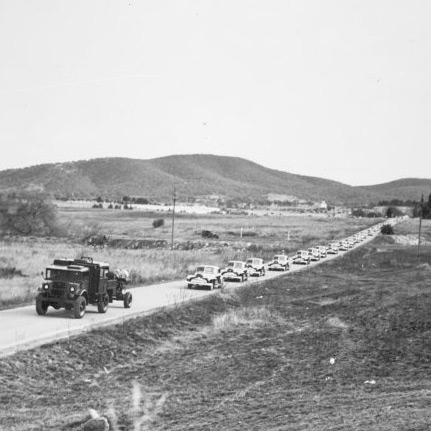Ben Chifley
Joseph Benedict Chifley was born on 22 September 1885 in Bathurst, New South Wales. The eldest son of Patrick and Mary Anne Chifley, Ben owed his name to St Benedict's Convent, Queanbeyan, where his mother had worked as a domestic servant.
From the age of five, Chifley lived with his grandfather and aunt at Limekilns, near Bathurst, where he saw little of his parents and siblings. He helped his grandfather on the farm and attended the local bush school two or three days a week. Although isolated, the young Chifley was a keen learner and scoured every book he could lay his hands on in search of new knowledge.
From 1899-1900, Chifley was enrolled at the Patrician Brothers’ High School in Bathurst where he studied classical and practical subjects including english and mathematics. The low-paid jobs he completed after his brief schooling encouraged him to undertake further training and, in 1914, he became the youngest qualified locomotive engine driver in New South Wales.
During his training, Chifley met Elizabeth McKenzie, the daughter of another engine driver. On religious grounds, both families openly disapproved of the relationship, but the couple defied their parents and the Catholic Church when they married in a Presbyterian ceremony in Sydney on 6 June 1914.
Catholics were forbidden to marry outside the Church following the introduction of the Papal decree, ne temere, in 1908.
As an active member of the Locomotive Engine-drivers, Firemens and Cleaners Association, Chifley took part in the prolonged 1917 strike that opposed the introduction of American time-and-motion working methods. During his time with the NSW Government Railways and Tramways, he developed a thorough understanding of the complex issues concerning wages and working conditions and became an influential advocate for the union in industrial disputes.
Over the next decade, Chifley made three unsuccessful attempts to enter the Australian parliament before he was finally elected to the House of Representatives seat of Macquarie in 1928. In championing the rights of the workers, he proposed the abolition of the states in favour of a centralised federal government.
Prime Minister James Scullin appointed Chifley Minister for Defence in 1931, but the position was short-lived when he suffered a landslide defeat in Macquarie later that year. Returning to Bathurst, he continued his active involvement in both local and national politics and, in 1935, was appointed to the Royal Commission on monetary and banking systems.
Chifley regained the seat of Macquarie in 1940 and when Labor took office on 7 October 1941, Prime Minister John Curtin promoted him to the high-ranking position of Treasurer. His primary objectives were to finance the war effort and to control inflation, which he largely achieved through the regulation of wages, reduction of private spending and the transfer of surplus personal income to savings and war loans.
Following the death of John Curtin in 1945, Francis Forde led the Labor government briefly before Ben Chifley was sworn in as Australia’s sixteenth Prime Minister on 13 July 1945.
During his time in office, Chifley was responsible for providing additional funding of public hospitals and state housing, the expansion of university education and the introduction of a new code of nationality and citizenship law that allowed non-Europeans the right to settle in Australia for business purposes.
As Prime Minister, Chifley also launched the first Holden car in 1948 and, prior to his election defeat by Robert Menzies the following year, oversaw the introduction of the Snowy Mountains Hydro-Electric Power Act 1949.
Chifley continued as Leader of the Opposition for the next eighteen months. Having decided not to attend the Jubilee Ball at Parliament House on 13 June 1951, he returned to his nearby room at the Kurrajong Hotel where he later suffered a fatal heart attack.
Ben Chifley was honoured with a State funeral at the Catholic Cathedral of St Michael and St John in Bathurst.




